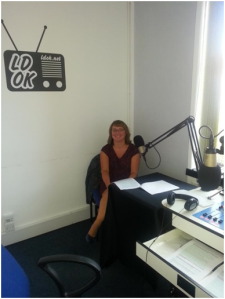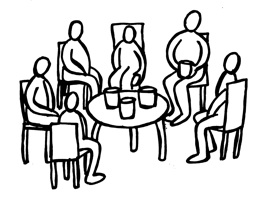Alternative Futures Group are the first provider to invest in a full time Community Circles Connector in Rochdale. It’s fantastic for Community Circles to have a dedicated post where we can develop circles of support at scale and share learning. We know that people are asking for circles of support to be more available and we are responding to that request. For Alternative Futures Group the Community Circles Connector post is in response to listening to what the people they support said was important to them; having friends and relationships in their lives.
For many people relationships and connections develop naturally, for others, often people with a label of disability, relationships aren’t as naturally occurring and we need to be intentional about inviting people into someone life. We need to be consciously recognising and supporting people’s gifts and talents so they can make a contribution in their local community, developing a valued role and connections.
My role as Community Circles Connector is to work with the people supported by Alternative Futures Group, who have a learning disability and also as part of our corporate social responsibility, to work with people who are living with dementia in Rochdale.
Our work within Alternative Futures Group focuses on the people we support, enabling them to have great lives with the support that makes sense to them. We are also conscious that the work we do creates ripples throughout our staff members and local communities
As part of our corporate social responsibility and to ensure the best possible outcomes for the people we support, we focus on working locally: with the people who use our services and their families, and with the local communities in which they live. We are conscious of our responsibilities as an ethical organisation and a responsible neighbour in the communities in which we work; it is our aim to work with our partners and stakeholders locally to increase capacity and social impact and to support communities to sustain themselves.
We recruit locally, to ensure that people are supported by staff who know the area intimately and who can truly connect them into their local communities in the way they want – enabling them to exercise their rights as citizens and to positively contribute to society and we train and supervise those staff within a clear development programme enabling them to gain in skills and confidence.
Community Circles is supported by people who are able to contribute a couple of hours a month to facilitate the circle. We recruit facilitators from a variety of backgrounds, students, businesses, community groups and faith communities, and also from our staff within Alternative Futures Group.
Community Circles brings many benefits; supporting the people we work with to achieve their purpose and develop connections, supporting our social corporate responsibility by working with other members of the community to develop a circle of support, connecting people within their local community that benefits everyone and supporting staff to develop skills and new experiences through the role of the facilitator, knowing that their contributions are making a difference.
Kelly, an Area Manager, facilitates a circle for a man who is living with dementia and his wife. Here she shares her experience of being a facilitator
The role of facilitator is something that interested me after hearing the benefits a circle can bring to someone’s life. In addition it was my opportunity to give something to the local community where I work. I was matched with the couple whose circle I facilitate. Their circle is made up of some life long friends and their daughter. Once we had identified the purpose of the circle, to return to the dances they enjoy, things really got moving. Once the conversation has started things really began to change for the couple. Although the people in the circle were involved in the couple’s life already it focused the conversation to enable to think about what they would like to achieve and how they were going to do this involving others. The circle meeting also enabled the couple to have a purpose to see their friends. This has further solidified their friendship and offers of help are accepted rather than thinking it’s too much trouble.
The circle has strengthen the support the couple have and creates a focused conversation every 4-6 weeks which enables them to think of different options to explore and support they can access. The couple of hours a month that I give to facilitate enables this conversation to happen, helps me to develop my skills and supports me to make a valued contribution in my local community.
If you want to find out more about Community Circles and how you could get involved, take a look at our new website http://community-circles.co.uk/
Cath Barton
Community Circles Connector
Alternative Futures Group Rochdale





